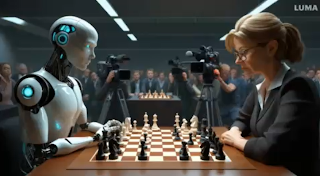In the world of chess, the rivalry between artificial intelligence (AI) and human super grandmasters (Super GMs) is a fascinating topic. Each possesses unique strengths and weaknesses that set them apart, making their encounters highly anticipated and thought-provoking. Let’s delve into the advantages and disadvantages of these two titans of the chessboard.
AI Chess Engines: Precision and Calculation at Superhuman Levels
Advantages
- Unparalleled Calculation Ability: AI engines, such as Stockfish and AlphaZero, can calculate millions of positions per second, ensuring that their moves are based on exhaustive analysis.
- Error-Free Play: Unlike humans, AI doesn’t tire, feel pressure, or make emotional decisions. This allows for consistent, flawless play throughout any game.
- Innovative Openings: AI engines have revolutionized opening theory, introducing novel lines and ideas that even Super GMs incorporate into their repertoire.
- Adaptability: AI learns and evolves rapidly. Self-learning engines like AlphaZero continuously refine their strategies, adapting to new challenges.
Disadvantages
- Over-Reliance on Calculation: AI sometimes struggles in positions that require long-term strategic understanding rather than tactical brute force.
- Lack of Human Insight: It doesn’t “understand” chess in the way humans do—it evaluates positions mathematically, sometimes missing nuanced human concepts.
- Unrealistic Endgames: AI can play endgames with precision that is unfeasible for humans, leading to moves that are impractical in a real match.
Super Grandmasters: The Pinnacle of Human Chess Mastery
Advantages
- Strategic Depth: Super GMs excel at forming long-term plans and leveraging psychological pressure on their opponents.
- Creativity and Intuition: Humans have a natural flair for creativity, making unexpected and resourceful moves that AI might overlook.
- Experience and Adaptation: Super GMs often possess decades of experience, allowing them to adapt to their opponent’s style and exploit psychological weaknesses.
- Time Management: In rapid or blitz formats, Super GMs often outshine AI engines due to their superior clock management and practical decision-making under time pressure.
Disadvantages
- Susceptibility to Errors: Unlike AI, humans are prone to blunders, particularly in high-stress situations or under time constraints.
- Fatigue: Long matches can take a toll on a human player, leading to diminished performance over time.
- Opening Dependence: Super GMs often rely on extensive preparation, which can be countered by AI’s ability to play offbeat or unconventional lines with equal strength.
The Verdict: A Clash of Titans
AI engines have pushed the boundaries of chess, setting a standard of perfection and inspiring new ideas. However, Super GMs bring a human touch to the game, weaving creativity and emotion into their play. While AI dominates in pure calculation and consistency, humans excel in intuition, adaptability, and the psychological aspects of chess.
In head-to-head matches, AI engines usually prevail due to their relentless precision. Yet, humans remain the soul of chess, keeping the game alive with their passion, stories, and legacy. The interaction between these two forces ensures that chess will continue to evolve, blending the best of human ingenuity and technological brilliance.
Who do you think has the ultimate edge in the chess world—AI or human Super GMs? Share your thoughts and join the debate!


No comments:
Post a Comment
Note: Only a member of this blog may post a comment.